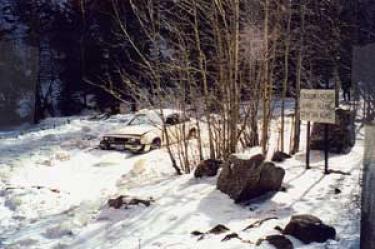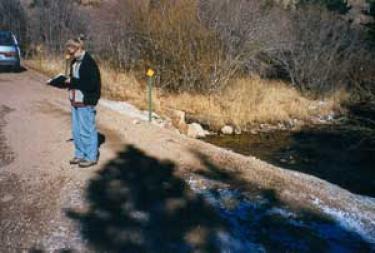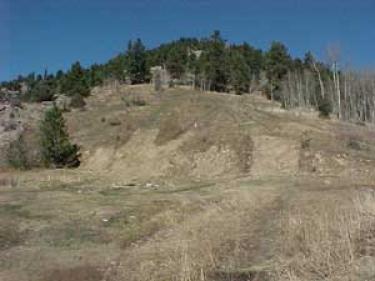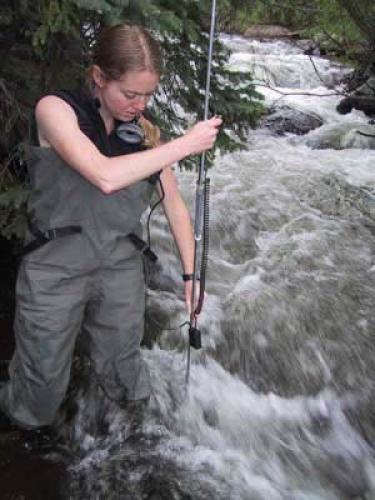Effect of Off-Road Vehicles on Water Quality in the James Creek Watershed
Overview

An aborted attempt of a crossing of James Creek - County Road 102J crosses the creek here (photo by Colleen Williams, James Creek Watershed Initiative)

Hanna Gilbert records data near one of the many locations where the James Creek runs directly adjacent to County Road 102J
Over the past few years, we have studied the effect of off-road vehicle recreation in the James Creek watershed, northwestern Boulder County, on water quality in James Creek. James Creek is the sole drinking water supply for Jamestown, a small mountain community of about 300 residents. Our research has focused on evaluation of differences in key water quality parameters (in particular, turbidity) along the reach of James Creek adjacent to County Road 102J. The inclusion of CR 102J in some widely-accessible off-road vehicle guides (e.g., Colorado Sports, 4x4 Explore, the Rocky Mountain Moggers, a Nissan Xterra owner) and the resulting heavy ORV use of the road and damage of the surrounding terrain appeared to have resulted in an increasing amount of turbidity in James Creek and an increasing inability of Jamestown's sand filtration treatment plant to reduce the turbidity to acceptable levels.
Since 1996, Jamestown was granted variances in 1997 and 1999 to the state turbidity requirement for drinking water from 1.0 to 2.5 and 5.0 nephelometric turbidity units (NTU). In December, 1999, the Boulder County Commissioners voted to close CR 102J to vehicle traffic to avoid exacerbating the public health problem. The issue was brought before the commissioners by the James Creek Watershed Initiative, a community organization working to protect and preserve the James Creek watershed. We have received two grants for the University of Colorado's Outreach Program to work with the JCWI on their projects.
Projects
- Investigating the Effects of Off-Road Vehicles on the Macroinvertebrate Population and Water Quality of James Creek with the James Creek Watershed Initiative
PI: Joe Ryan
University of Colorado Outreach Program Grant, 2001

Slope erosion caused by off-road vehicle "challenge courses" at the Fair Day Meadow in the James Creek watershed (photo by Colleen Williams, JCWI)
- Assessing the Effects of Off-Road Vehicles on Turbidity in the James Creek Watershed, Northwestern Boulder County, Colorado
PI: Joe Ryan
University of Colorado Outreach Program Grant, 1999-2000 - Metals in the Sediments of James Creek, Northwestern Boulder County, Colorado
National Science Foundation Research Experience for Undergraduates, 2000
Collaborators
- Colleen Williams, Director, James Creek Watershed Initiative, Jamestown, Colorado
- Diane McKnight, Professor, Department of Civil, Environmental, and Architectural Engineering and INSTAAR, University of Colorado, Boulder
Students and Theses

Sabre Duren measures flow rate in James Creek with a pygmy flow meter
Our studies of water quality in James Creek have involved undergraduates students in the First Year Engineering Projects course (GEEN 1400), a fourth-year Water Quality course (CVEN 3454), two independent studies, two honors theses in the Environmental Science degree program, and a National Science Foundation Research Experience for Undergraduates.
- Hanna Gilbert, B.A. Environmental Studies, Honors Thesis, 1999 (abstract), Evaluation of James Creek Turbidity Levels, Causes, and Effects: Northwest Boulder County, Colorado. Hanna's work established that the turbidity problem in James Creek was exacerbated by off-road vehicle recreation.
- Shannon Taylor, Civil, Environmental, and Architectural Engineering, Independent Study Final Report, 2000, Turbidity Study of James Creek to Evaluate Sediment from Non-Point Source Pollution. Shannon's report shows that sources of turbidity correlate highly with the locations of past off-road vehicle-induced damage.
- Brooke Miller, Civil, Environmental, and Architectural Engineering, National Science Foundation Research Experience for Undergraduates Final Report, 2000, Metals in the Sediments of James Creek, Northwestern Boulder County, Colorado. Brooke examined the metal content of the James Creek sediments to test the possibility of using ORV-derived metal tracers as indicators of ORV activity and their effect on water quality.
- Sabre Duren, B.A. Environmental Studies, Honors Thesis, 2001, Investigating the Effects of Off-Road Vehicles on the Macroinvertebrate Population and Water Quality of James Creek. Sabre's study examined the link between water quality and the populations of benthic macroinvertebrates. Sabre received an Undergraduate Research Opportunity Grant to fund her field work.
Publications
- A February, 2000, artJoeJicle in the Carillon, the University of Colorado's alumni magazine.
- An April, 2000, an article in the newsletter of the Civil, Environmental, and Architectural Engineering Department (on page 10 of 21).

